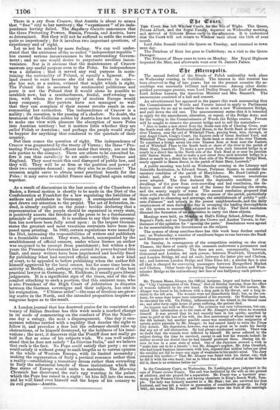There is a cry from Cracow, that Austria is about
to annex that "free" city to her territory ; the " experiment " of its inde- pendence having failed. The Augsburg Gazette announces that the three Protecting Powers, Russia, Prussia, and Austria, have so determined. But they will not be suffered to settle the matter quite so imperiously ; for it involves two important questions, of expediency and of right. Let us not be misled by mere feeling. We can well under- stand that the existence of the so-called " independent republic " has caused serious inconvenience to the surrounding Govern- ment ; and no one would desire to perpetuate needless incon- venience. Nor is it obvious that the maintenance of Cracow answers any useful purpose even to the Poles. Its independence was a delusion ; that it served any real purpose in main- taining the nationality of Poland, is equally a figment. Po- land ceased to exist because she did not deserve to exist— she has not as a nation, evinced that might which is right. The Poland that is mourned by sentimental politicians and poets is not the Poland that it would alone be possible to establish now, but a semibarbarous, feudal, serf-owning na- tion, with whom no free country of modern Europe would keep company. Her patriots have not managed so well that they can complain if their recent revolts result in con- summating her extinction. The independence of Cracow is a nullity; its cessation is the passing of a shadow. No doubt, the treatment of the Gallician nobles by Austria has not been such as to make one view with pleasure the absorption of more Poles into Austrian territory : but it matters little whether they are 'called Polish or Austrian ; and perhaps the people would really be happier for anything that conduced to the quietude of their country. But then comes the question of right. The independence of Cracow was guaranteed by the treaty of Vienna ; the three " Pro- tecting Powers," appointed officers under that treaty, are not the sole parties to the compact. There are others to be consulted be- fore it can thus cavalierly be set aside—notably, France and England. They must resist this cool disregard of public law, and they will. They will be as firm as the position and power of their two countries demand : may they also be as discreet ! The occasion might serve to obtain some practical benefit for the Poles : it may serve to exhibit France and England again acting together.


























 Previous page
Previous page